North Korea has shut down multiple diplomatic missions across the world because of apparent economic difficulties, according to reports.
In a diplomatic notice shared with the People’s Communist Party of Spain, Pyongyang announced the permanent closure of its embassy in Madrid, saying that going forward, all matters involving Spain will be handled by the embassy in Italy.





